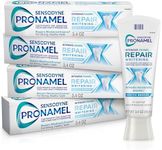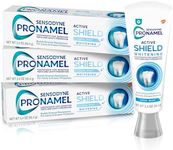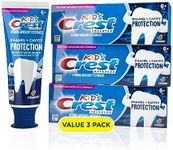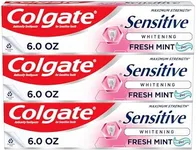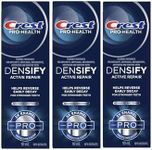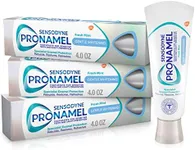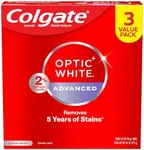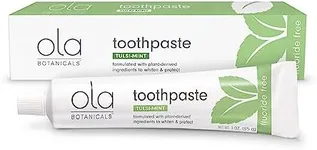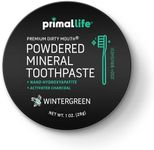Buying Guide for the Best Toothpaste For Repairing Tooth Enamel
Choosing the right toothpaste for repairing tooth enamel is crucial for maintaining good oral health. Tooth enamel is the hard, outer surface layer of your teeth that serves to protect against tooth decay. Over time, enamel can wear down due to various factors such as acidic foods, poor oral hygiene, and aging. Using a toothpaste specifically designed to repair and strengthen enamel can help prevent further damage and promote overall dental health. Here are some key specifications to consider when selecting a toothpaste for repairing tooth enamel.Fluoride ContentFluoride is a mineral that helps to strengthen tooth enamel and prevent cavities. It is one of the most important ingredients in toothpaste for repairing enamel. Toothpastes typically contain varying levels of fluoride, measured in parts per million (ppm). For effective enamel repair, look for a toothpaste with at least 1,000 ppm of fluoride. If you have sensitive teeth or are prone to cavities, you might benefit from a higher fluoride concentration, such as 1,450 ppm. Always check the label and choose a fluoride level that matches your dental needs.
Calcium PhosphateCalcium phosphate is another key ingredient that can help repair and remineralize tooth enamel. It works by providing essential minerals that are lost during the demineralization process. Toothpastes containing calcium phosphate can help rebuild weakened enamel and make teeth more resistant to decay. When choosing a toothpaste, look for formulations that include calcium phosphate or similar compounds like hydroxyapatite. These ingredients are particularly beneficial if you have early signs of enamel erosion or are looking to strengthen your teeth.
pH LevelThe pH level of toothpaste can influence its effectiveness in repairing enamel. Toothpastes with a neutral or slightly alkaline pH are better for enamel repair because they help neutralize acids in the mouth that can erode enamel. Acidic toothpastes can contribute to further enamel wear. When selecting a toothpaste, opt for one that has a pH level around 7 or higher. This will help create an environment in your mouth that supports enamel remineralization and overall dental health.
AbrasivenessAbrasiveness refers to the toothpaste's ability to remove surface stains and plaque without damaging the enamel. Toothpastes are rated on the Relative Dentin Abrasivity (RDA) scale, with lower numbers indicating less abrasiveness. For enamel repair, it is important to choose a toothpaste with a low to moderate RDA value, typically below 70. Highly abrasive toothpastes can wear down enamel further, so if you have sensitive teeth or existing enamel erosion, opt for a gentler formula to protect and repair your enamel.
Desensitizing AgentsDesensitizing agents, such as potassium nitrate or stannous fluoride, can help reduce tooth sensitivity, which is often a symptom of enamel erosion. These ingredients work by blocking the pathways that lead to the nerves inside the teeth, providing relief from sensitivity. If you experience tooth sensitivity, look for a toothpaste that includes desensitizing agents. This will not only help manage discomfort but also support the repair and strengthening of your enamel.
